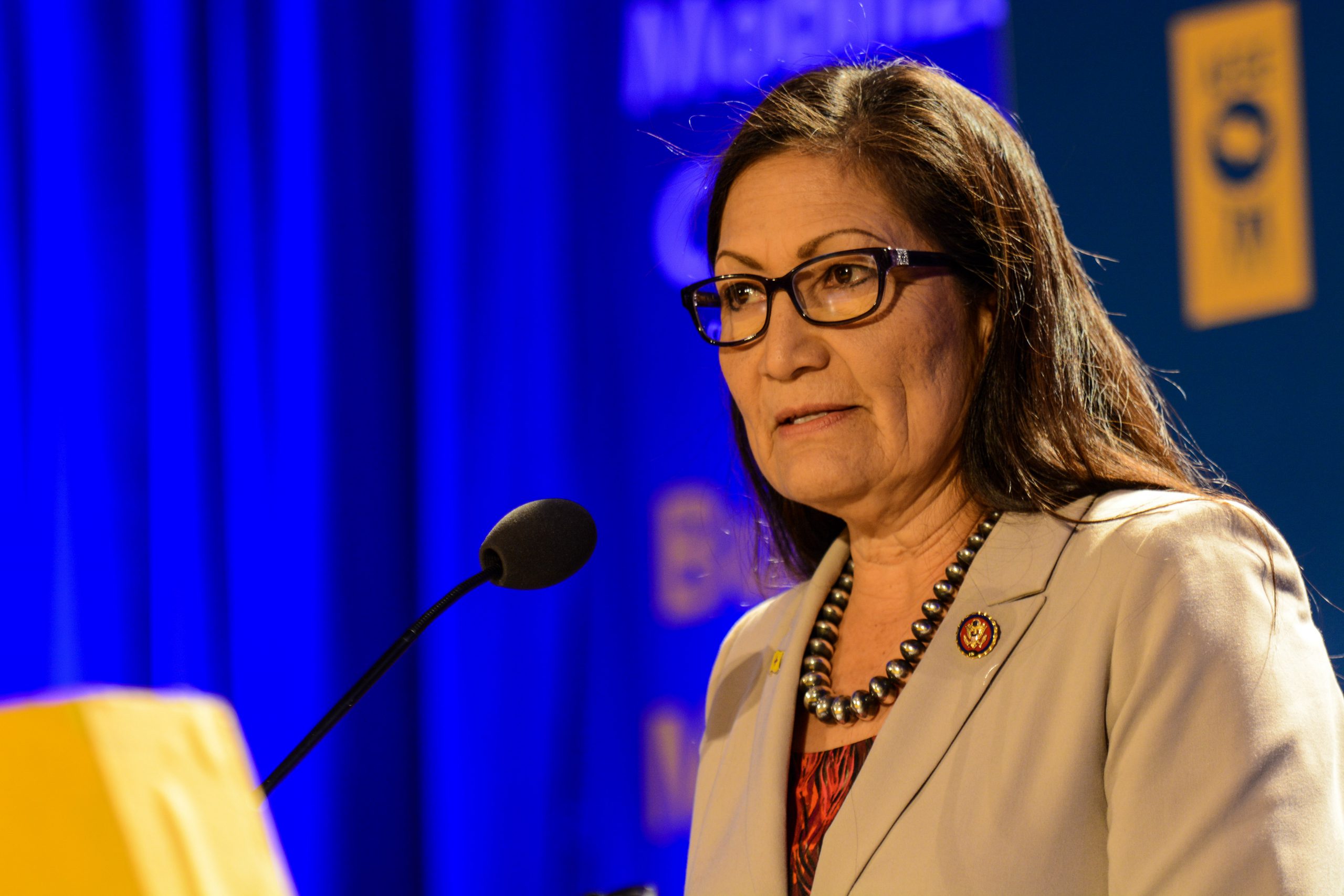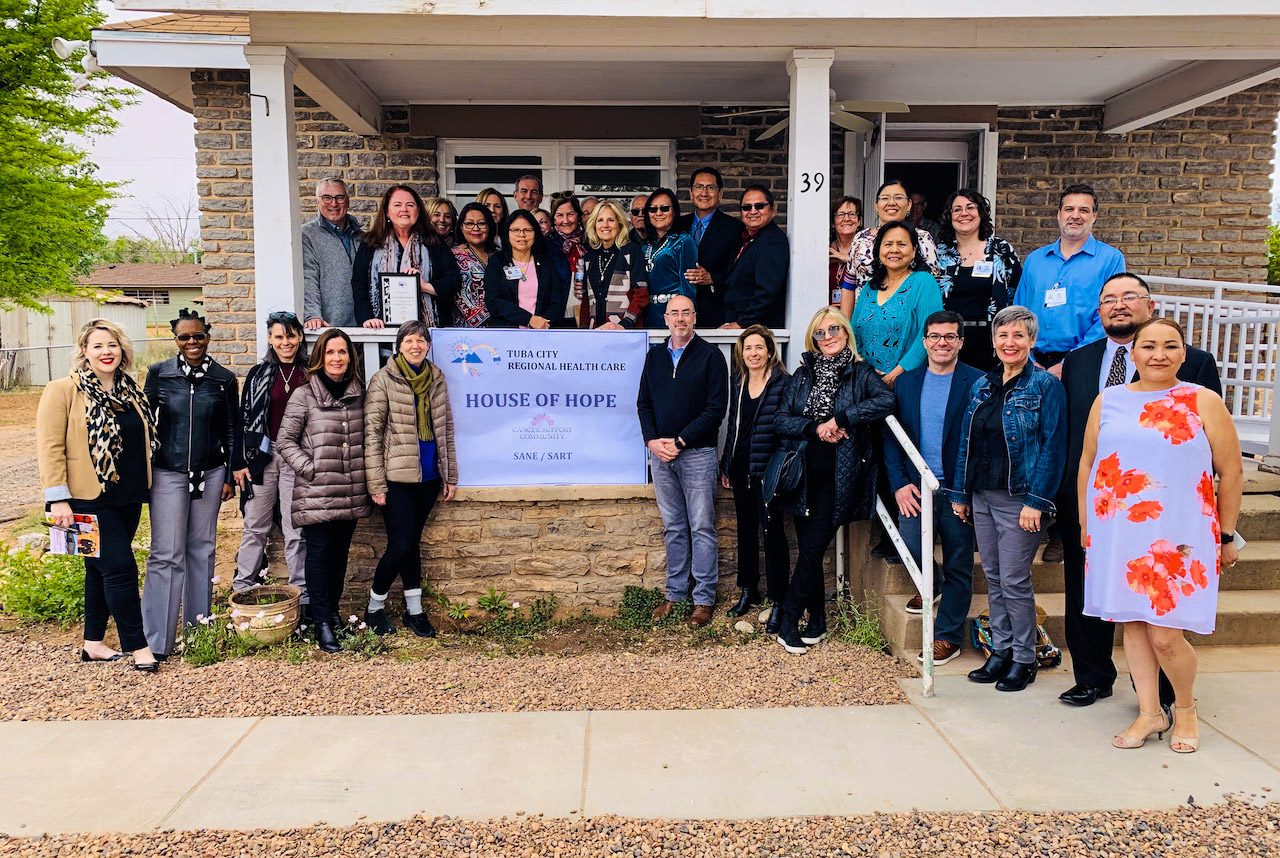Indianz.Com > News > Cronkite News: Indian Country prepares for new era with Joe Biden as president
Tribal leaders optimistic about Biden; Haaland nomination a good start
Monday, December 28, 2020
Cronkite News
WASHINGTON – The federal government may not have a stellar track record when it comes to keeping promises with Native Americans, but tribal leaders in Arizona said they think President-elect Joe Biden could be the exception.
Their hopes were reinforced last week when Biden nominated a Native woman, Rep. Deb Haaland, D-N.M., to be secretary of Interior. If approved, she would be the first
Native American Cabinet secretary.
Reaction from Tohono O’odham Nation Chairman Ned Norris Jr., who welcomed “the historic nomination of Congresswoman Haaland,” was typical of tribal responses.
“She will bring a unique and long overdue perspective to the department, as well as a fierce determination to protect our environment and the rights of indigenous people,” Norris said in a statement Friday. “The Nation urges the Senate to quickly hold hearings and approve her nomination so she can get to work right away.”



That’s why she was so encouraged by the nomination of Haaland, who she thinks will be an “ideal” Interior secretary. “Protecting our natural resources and public lands are responsibilities that are ingrained into Indigenous peoples. I believe Rep. Haaland has an inherent understanding of the duties and responsibilities the position requires, and because of this, she will excel,” Davis said. While they like what they have seen so far, tribal leaders said there is much more they hope to see from a Biden administration, with health care at the top of the list. Lewis said immediate COVID-19 relief is “mission critical” for the U.S., but particularly for tribal areas that have been hit hard by the pandemic. But he said tribal efforts have been thwarted by a lack of federal leadership on the issue. COVID-19 is not the only health care problem in Indian Country, and officials welcomed Biden’s acknowledgement that “the Indian Health Service (IHS) has been underfunded for decades” and “consistently faces the uncertainty of the federal budget process.” He has pledged to increase and stabilize IHS funding. As with COVID-19, Nez said infrastructure is both a tribal and a national issue. “For us on Navajo, the focus is on infrastructure. Water, electricity, broadband and, of course, better roads, repairing bridges,” he said. “And I think that’s the commonality throughout this country and I think that’s where we can start. We can start there to unite this country and move forward.” Davis, who said the extraction of natural resources has made “the Navajo Nation … a sacrifice zone,” agreed with Nez that infrastructure should be a priority. While she thought the Biden-Harris platform could have been more detailed, she liked that it provided for small business development incentives, technical assistance for tribes, communication infrastructure development and a “just and equitable transition” toward clean energy. But “the first thing we would like to see is reversal of the executive orders … that gutted parts of the Environmental Protection Act,” Davis said. She noted that this is something Biden could do without congressional approval. Norris points to Trump administration orders that allowed the Department of Homeland Security to “unilaterally waive environmental and cultural protection laws when building border barriers,” specifically the border wall slicing right through Tohono O’odham lands. “We must also have an immediate end to construction of President Trump’s failed border wall, which has desecrated our sacred sites,” Norris’ statement said. “We will work with the Biden administration and Congress on action to ensure this can never happen again.” Tribal leaders said they hope Biden taps “the best and brightest, the most qualified Native Americans” for high-level jobs for his administration. That would be a start in building their trust in the federal government, which is notoriously low: 96% of Native Americans distrust the federal government, according to a recent survey. Nez called the Haaland nomination a step in the right direction, thanking the “Biden-Harris team for making a statement and keeping their word to place Native Americans in high-level Cabinet positions.” But that doesn’t mean a Democratic administration should take Native Americans for granted, he said. “We just got to remind those that got elected that we did assist them in this way (voting) and Native Americans in the past have contributed great things to this country,” Nez said.With Deb Haaland leading the Department of the Interior, the Congresswoman from New Mexico "will help me strengthen the nation-to-nation relationship" between tribes and United States, President-elect Joe Biden said.@RepDebHaaland @RepDebHaaland #SkoDebhttps://t.co/zX6zI1nKA1 pic.twitter.com/4hzAQoW1AV
— indianz.com (@indianz) December 19, 2020
Lewis said Biden’s election has reenergized his community, but the excitement comes with high expectations. “It will take time,” Lewis said of Biden’s ability to follow through on his promises. Nez said just having Biden and Harris in the White House is a start. “I think this country needs inspirational leaders that will heal this country and move forward and to unite all peoples,” he said. “We’re looking forward to that.” Even Davis – with her more cautious outlook – said of the Biden-Harris administration, “I have faith that they will try.” For more stories from Cronkite News, visit cronkitenews.azpbs.org.A voice like mine has never been a Cabinet secretary or at the head of the Department of Interior.
— Deb Haaland (@DebHaalandNM) December 18, 2020
Growing up in my mother’s Pueblo household made me fierce. I’ll be fierce for all of us, our planet, and all of our protected land.
I am honored and ready to serve.
Note: This story originally appeared on Cronkite News. It is published via a Creative Commons license. Cronkite News is produced by the Walter Cronkite School of Journalism and Mass Communication at Arizona State University.
Search
Filed Under
Tags
More Headlines
Press Release: National Museum of the American Indian hosts Native art market
AUDIO: Sea Lion Predation in the Pacific Northwest
Native America Calling: Tribal colleges see an uncertain federal funding road ahead
Native America Calling: Short films taking on big stories
Native America Calling: Advocates push back against new obstacles to Missing and Murdered Indigenous Relatives momentum
Native America Calling: For all its promise, AI is a potential threat to culture
NAFOA: 5 Things You Need to Know this Week (November 24, 2025)
Chuck Hoskin: Cherokee Nation invests in rural transportation
Native America Calling: Native candidates make strides in local elections
National Congress of American Indians returns incumbents and welcomes newcomers to leadership
National Congress of American Indians chooses leadership at big convention
‘Not voting is still a vote’: Native turnout drops amid changes in political winds
Native America Calling: Indigenous voices speak up, but have little clout at COP30
‘It’s bull****’: Indian Country confronts challenges at largest inter-tribal conference
Native America Calling: The constant burden on tribal hunters to justify their treaty rights
More Headlines
AUDIO: Sea Lion Predation in the Pacific Northwest
Native America Calling: Tribal colleges see an uncertain federal funding road ahead
Native America Calling: Short films taking on big stories
Native America Calling: Advocates push back against new obstacles to Missing and Murdered Indigenous Relatives momentum
Native America Calling: For all its promise, AI is a potential threat to culture
NAFOA: 5 Things You Need to Know this Week (November 24, 2025)
Chuck Hoskin: Cherokee Nation invests in rural transportation
Native America Calling: Native candidates make strides in local elections
National Congress of American Indians returns incumbents and welcomes newcomers to leadership
National Congress of American Indians chooses leadership at big convention
‘Not voting is still a vote’: Native turnout drops amid changes in political winds
Native America Calling: Indigenous voices speak up, but have little clout at COP30
‘It’s bull****’: Indian Country confronts challenges at largest inter-tribal conference
Native America Calling: The constant burden on tribal hunters to justify their treaty rights
More Headlines